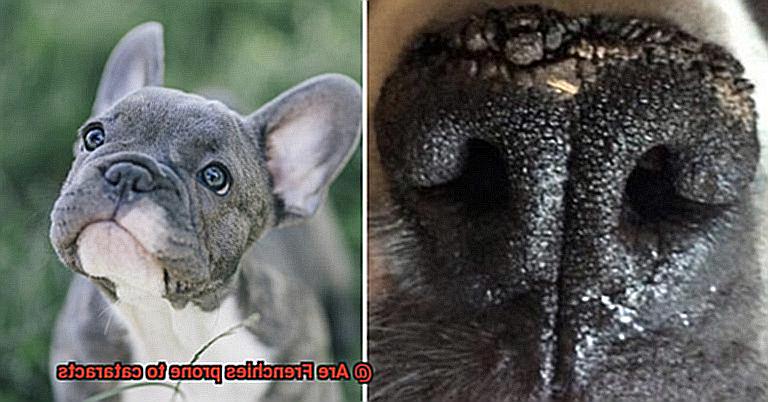Are Frenchies prone to cataracts?
French Bulldogs, those irresistibly cute bundles of squishiness and boundless energy, have captured the hearts of dog lovers worldwide. But lurking behind their lovable facade is a potential health concern – cataracts. These hazy obstructions that cloud the lens of the eye can wreak havoc on a Frenchie’s vision, potentially leading to complete blindness if left untreated.
As responsible pet parents, it’s crucial for us to grasp the prevalence, causes, effects, and available treatments for cataracts in French Bulldogs. So come along as we dive into the captivating world of these ocular anomalies, uncovering ways to prevent their onset and shining a light on cutting-edge treatment options.
Together, let’s ensure our beloved Frenchies enjoy a life filled with clear sight and endless joy.
Are Frenchies prone to cataracts
Contents
- 1 Are Frenchies prone to cataracts
- 2 Is There a Genetic Component to Cataract Development in French Bulldogs?
- 3 What Are the Signs and Symptoms of Cataracts in French Bulldogs?
- 4 Why Early Detection is Essential for Treating French Bulldogs with Cataracts
- 5 Surgical Treatment for Cataracts in French Bulldogs
- 6 Non-Surgical Management Options for Dogs with Cataracts
- 7 Preventative Measures to Reduce the Risk of Cataracts in Frenchies
- 8 The Benefits of Seeking Veterinary Attention Promptly for Dogs with Cataracts
- 8.1 Preserving Vision: The Power to Slow Down Cataracts
- 8.2 Unmasking Underlying Causes: Revealing the Truth Behind Cataracts
- 8.3 Choosing the Right Treatment: A Tailor-Made Solution
- 8.4 Relieving Discomfort: Saving the Day for Your Frenchie’s Eyes
- 8.5 Monitoring and Support: A Sidekick for Your Frenchie’s Journey
- 9 How to Recognize the Early Signs of Cataracts in Your Frenchie
- 10 Conclusion
However, like any breed, French Bulldogs are susceptible to certain health issues, one of which is cataracts.
In this article, we’ll explore why Frenchies are more prone to developing cataracts than other breeds and what you can do to help protect your furry friend’s vision.
Understanding Cataracts:
Cataracts are a common eye condition characterized by the clouding of the lens. While they can affect any dog breed, certain breeds, including French Bulldogs, have a higher risk due to genetic predispositions.
Inherited cataracts, also known as primary or genetic cataracts, are the most common type observed in French Bulldogs. These cataracts are believed to be inherited in an autosomal recessive manner.
Prevalence and Symptoms:
While the exact prevalence of cataracts in Frenchies is not well-documented, studies suggest that they are more susceptible than some other breeds. Symptoms of cataracts may include cloudy or hazy eyes, difficulty seeing in low light conditions, increased sensitivity to light, and changes in behavior or activity levels.
If left untreated, cataracts can lead to severe vision impairment or even blindness in affected dogs.
Treatment Options:
The only effective treatment for cataracts in dogs is surgical removal of the affected lens. This procedure, called phacoemulsification, involves breaking up the clouded lens and replacing it with an artificial lens implant. However, not all dogs are suitable candidates for surgery, and the decision should be made in consultation with a veterinary ophthalmologist.
Prevention and Care:
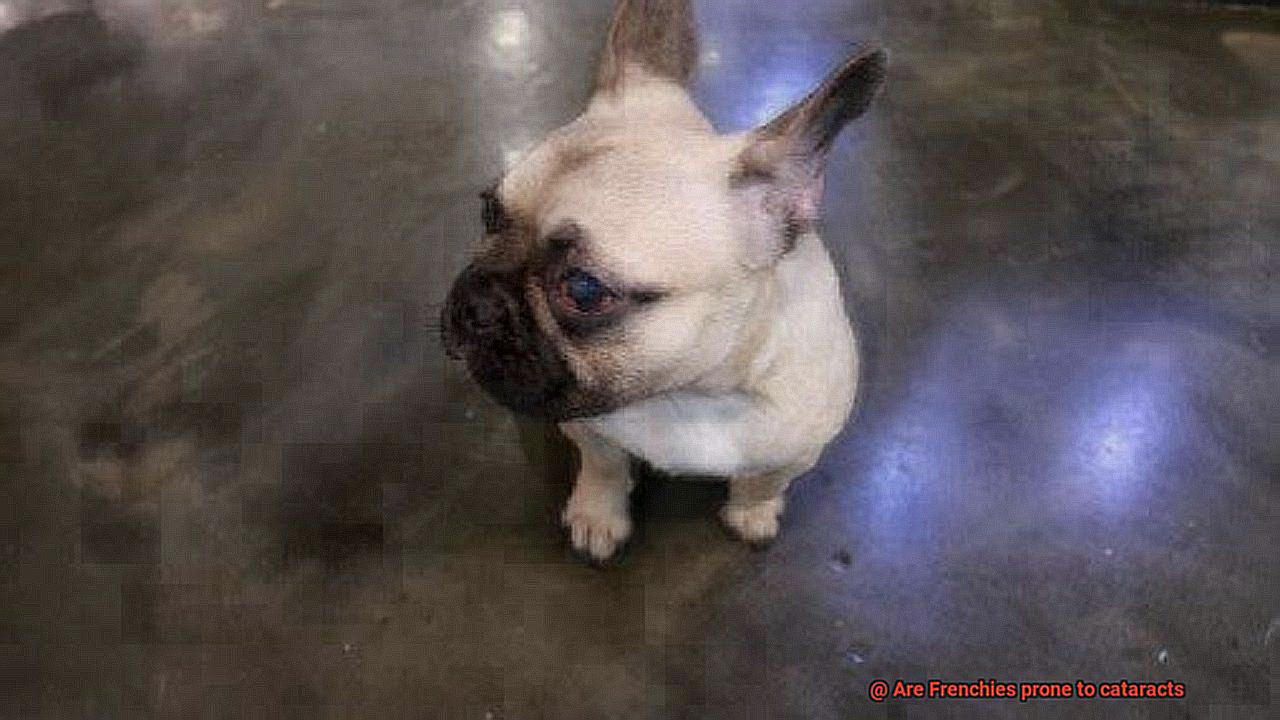
Preventative measures can help reduce the risk of cataracts in French Bulldogs. Responsible breeders should screen their breeding dogs for cataracts and avoid mating individuals with a history of the condition. Regular veterinary check-ups, a healthy diet, and avoiding exposure to known environmental toxins can also help protect your Frenchie’s eyes.
Is There a Genetic Component to Cataract Development in French Bulldogs?
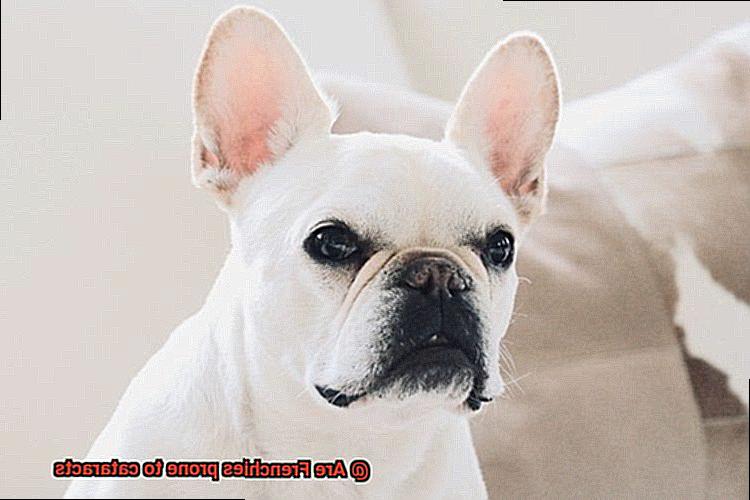
Cataracts are a common eye condition in dogs, and research suggests that there is indeed a genetic component to cataract development in French Bulldogs.
A study published in the journal Veterinary Ophthalmology found that French Bulldogs had a higher prevalence of cataracts compared to other dog breeds. This study also identified specific genes that were associated with cataract development in French Bulldogs. These genes are involved in the formation and maintenance of the lens in the eye, and mutations in these genes can lead to abnormal lens development and the formation of cataracts.
The inheritance pattern of cataracts in French Bulldogs is believed to be autosomal recessive, which means that both parents must carry the gene mutation for their offspring to develop cataracts. This is why it is important for breeders to screen their breeding dogs for cataracts and only breed those that are free from the genetic mutation associated with cataract development.
Regular eye examinations by a veterinary ophthalmologist can also help detect cataracts early on and prevent them from progressing to a stage where they affect the dog’s vision. By catching cataracts early, treatments such as surgery may be an option to restore your furry friend’s sight.
While genetics play a significant role in cataract development in French Bulldogs, it’s essential to note that other factors such as age, nutrition, and environmental factors may also contribute to their development. Therefore, it is crucial for owners to provide their French Bulldogs with a balanced diet, regular exercise, and routine veterinary care.
So, if you have a French Bulldog, keep an eye out for any changes in their vision or eye health. If you notice any abnormalities, don’t hesitate to seek veterinary care. Remember, a proactive approach and early detection can go a long way in preserving your French Bulldog’s precious eyesight. After all, they rely on their vision to explore the world with curiosity and joy.
What Are the Signs and Symptoms of Cataracts in French Bulldogs?
One vital aspect of their well-being is their vision. Unfortunately, French Bulldogs are prone to developing cataracts, a condition that can lead to vision impairment or even blindness if left untreated. In this article, we will explore the signs and symptoms of cataracts in French Bulldogs, as well as offer tips on how to protect their precious sight.
Signs and Symptoms:
- Cloudiness or Discoloration: One of the earliest signs of cataracts in French Bulldogs is a slight cloudiness or haze in their eyes. This may initially be subtle and easily overlooked, but as the condition progresses, you may notice a white or grayish discoloration in the affected eye.
- Changes in Behavior: Frenchies with cataracts may exhibit changes in behavior. They may become hesitant or reluctant to jump or navigate obstacles they previously had no trouble with. This is because cataracts impair their depth perception and overall vision, making it challenging for them to judge distances accurately.
- Excessive Squinting or Blinking: Cataracts can cause discomfort or sensitivity to light, leading your French Bulldog to squint or blink excessively. If you notice your Frenchie frequently closing their eyes tightly or blinking rapidly in bright light, it could be a sign of cataracts.
- Impaired Visual Tasks: Another symptom to watch out for is difficulty with visual tasks. Your Frenchie may bump into objects, misjudge distances while playing fetch, or have trouble locating toys or treats.
Prevention and Treatment:
- Regular Eye Examinations: Schedule regular check-ups with a veterinarian who specializes in ophthalmology. They will monitor your French Bulldog’s eye health and detect any signs of cataracts early on.
- Genetic Testing: If you are considering breeding your French Bulldog, it is important to have them tested for the genetic mutation associated with cataracts. This can help prevent the passing on of the condition to future generations.
- Prompt Veterinary Attention: If you suspect your French Bulldog may have cataracts, seek veterinary attention promptly. A thorough eye examination will confirm the presence of cataracts and determine the appropriate course of treatment.
- Surgical Options: Depending on the severity and impact on your Frenchie’s quality of life, surgery may be recommended to remove or replace the affected lens. Discuss the available options with your veterinarian to make an informed decision.
Why Early Detection is Essential for Treating French Bulldogs with Cataracts
French Bulldogs are adorable little pups with big personalities, but they also have a higher risk of developing cataracts compared to other dog breeds. Cataracts occur when the lens of the eye becomes cloudy, leading to impaired vision or even blindness. That’s why early detection is absolutely crucial when it comes to treating cataracts in these furry friends.
But why is early detection so important? Well, let me break it down for you:
- Prevent Further Complications: If left untreated, cataracts can lead to other eye problems like glaucoma or retinal detachment. And trust me, you don’t want your French Bulldog to experience permanent vision loss. By catching cataracts early, you can prevent these complications from occurring.
- More Treatment Options: When it comes to treating cataracts in French Bulldogs, the earlier the better. With early detection, your veterinarian can consider a range of treatment options such as medication, dietary management, or surgery. These interventions can slow down the progression of the cataracts and improve your pup’s overall eye health.
- Surgery Success: Now, I know the thought of your furry friend going under the knife might make you nervous, but cataract surgery is often the most effective treatment option. During the procedure, the clouded lens is removed and replaced with an artificial one. The success rate of this surgery in French Bulldogs is generally high, especially when performed by an experienced veterinary ophthalmologist.
So how can you detect cataracts in your French Bulldog? Keep an eye out for cloudy or opaque eyes, difficulty seeing in low light, increased clumsiness or bumping into objects, and a change in eye color. If you notice any of these signs, don’t wait. Schedule a regular eye examination with a veterinary ophthalmologist as soon as possible.
Remember, prevention is better than cure. Regular eye examinations are especially important as your French Bulldog gets older or if there’s a family history of cataracts. By being proactive about your pup’s eye health and seeking immediate veterinary attention, you can give them the best chance at maintaining their precious sight.
Surgical Treatment for Cataracts in French Bulldogs
Cataracts in French Bulldogs can be a debilitating condition that affects their vision and overall quality of life. Thankfully, surgical treatment options are available to help restore their sight.
In this article, we will explore the surgical treatment for cataracts in French Bulldogs, including the procedure itself, the importance of preoperative evaluation, and postoperative care.
Phacoemulsification: The Gold Standard Procedure
Phacoemulsification is the most common surgical procedure used to treat cataracts in dogs, including French Bulldogs. This procedure involves using ultrasound energy to break up the cloudy lens and remove it through a small incision.
The benefits of phacoemulsification include its effectiveness and minimal invasiveness, making it the gold standard for cataract surgery in dogs.
Preoperative Evaluation: Assessing Suitability for Surgery
Before undergoing cataract surgery, a thorough preoperative evaluation is necessary to assess the overall health of the French Bulldog and determine if they are suitable candidates for surgery.
This evaluation may involve blood tests, ocular examinations, and imaging studies to identify any underlying eye conditions or health issues that could affect the success of the surgery.
Expertise of Veterinary Ophthalmologists
Specialized veterinary ophthalmologists are the professionals who perform cataract surgeries on French Bulldogs. Their expertise and equipment ensure that these delicate procedures are carried out with precision and care.
It is crucial to seek out a qualified veterinary ophthalmologist who has experience in performing cataract surgeries on French Bulldogs to ensure the best possible outcome.
Postoperative Care: Ensuring Proper Healing
After cataract surgery, proper postoperative care is essential for the French Bulldog’s recovery. This may involve administering prescribed medications, using protective eyewear to prevent injury to the eye, and regular follow-up visits with the veterinary ophthalmologist. Following these postoperative care instructions diligently will help minimize complications and ensure optimal healing.
Considerations and Costs
While cataract surgery can be a life-changing procedure for French Bulldogs, it is important to consider individual factors such as age, overall health, and lifestyle before making a decision. Consulting with a veterinary ophthalmologist will provide valuable insights into the best course of action for each specific case.
It is also important to note that cataract surgery in French Bulldogs can be expensive due to the specialized nature of the procedure. However, pet insurance or financial assistance programs may help alleviate some of the costs. It is worth exploring these options to ensure that your furry friend receives the treatment they need.
Non-Surgical Management Options for Dogs with Cataracts
While surgical intervention is the most effective treatment option, non-surgical management can play a crucial role in slowing down progression and improving overall eye health. In this article, we will explore non-surgical options for managing cataracts in French Bulldogs, helping you make informed decisions about your furry friend’s care.
Topical Medications:
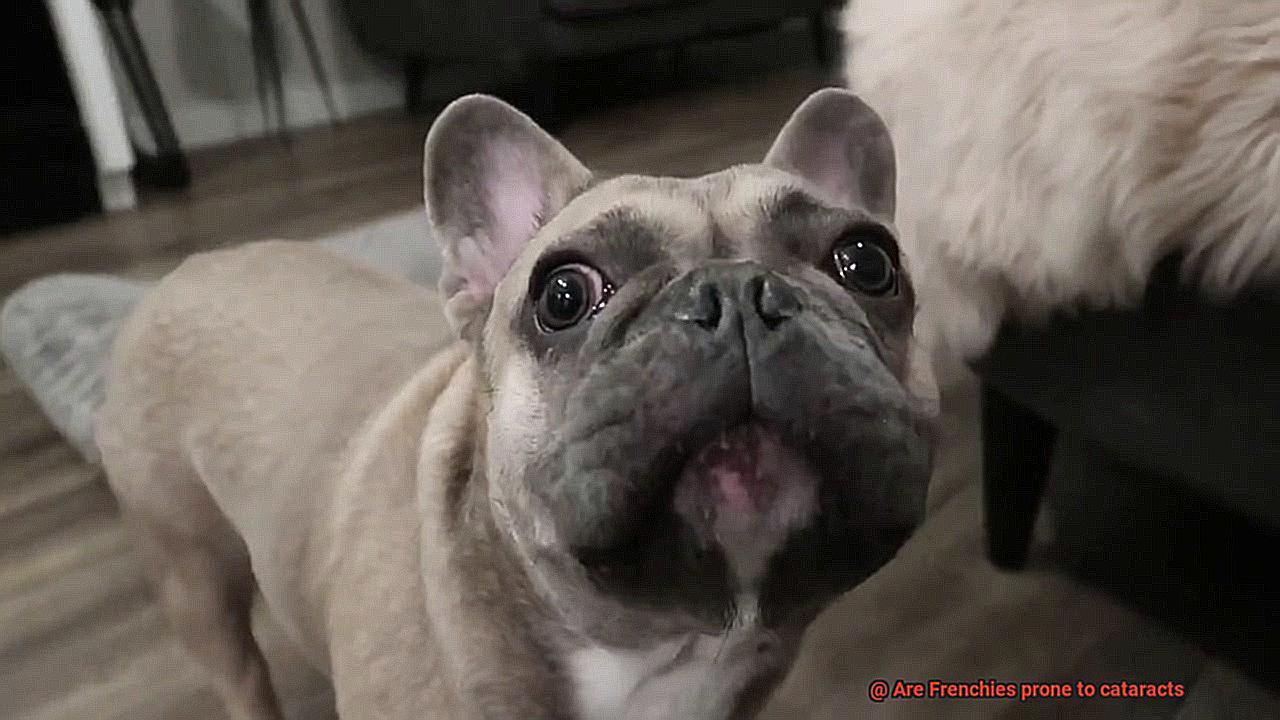
Topical medications, such as eye drops or ointments, can help reduce inflammation and promote eye health. Although they cannot reverse cataracts, they alleviate discomfort and prevent secondary complications. Consult your veterinarian to find the most suitable medication for your French Bulldog.
Dietary Modifications:
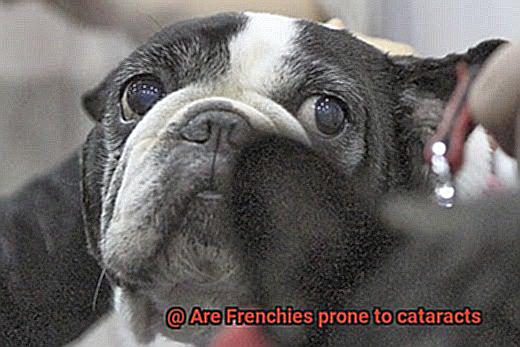
Certain nutrients, like antioxidants and omega-3 fatty acids, have shown potential in supporting eye health and slowing down cataract progression. Collaborate with your veterinarian or a veterinary nutritionist to design a diet tailored to your French Bulldog’s needs.
Eye Health Supplements:
Supplements containing vitamins, minerals, and antioxidants may provide additional support for your dog’s eye health. However, it is vital to consult with your veterinarian before starting any supplement regimen to ensure safety and efficacy.
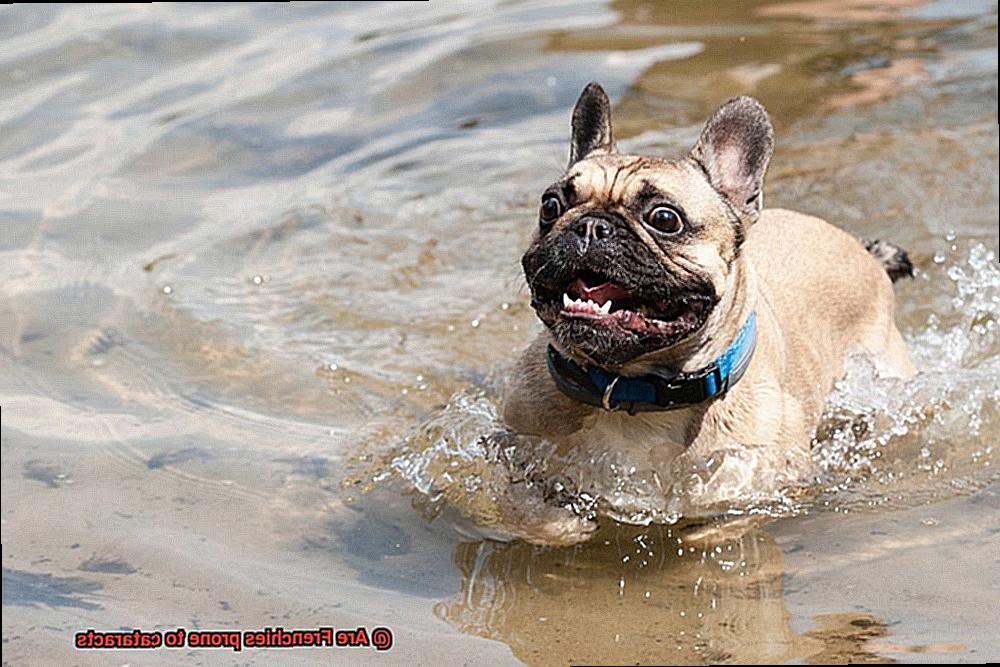
Regular Monitoring:
Regular check-ups with a veterinarian or veterinary ophthalmologist are essential to monitor cataract progression and make necessary adjustments to the management plan. Early detection of complications or changes in vision is crucial for effective management.
Remember that non-surgical management options cannot reverse cataracts or restore vision. Surgical intervention remains the gold standard for restoring sight in dogs with cataracts. Consulting with a veterinarian or veterinary ophthalmologist will help determine the best course of action for your French Bulldog.
Preventative Measures to Reduce the Risk of Cataracts in Frenchies
Did you know that cataracts can be a real villain when it comes to your eye health? But fear not, because I’m here to reveal some preventative measures that can help reduce the risk and keep those peepers shining bright like a superhero’s spotlight.
Supercharge their Nutrition:
Feeding your Frenchie a well-balanced diet is like giving them a power-up against cataracts. Load ’em up with foods rich in antioxidants, like blueberries and carrots. These superfoods help fight off nasty villains called free radicals, keeping your eyes healthy and strong.
Eye Check-Ups: The Sidekick You Need:
Just like Batman needs Robin, your Frenchie needs regular check-ups with a veterinarian to keep those eyes in tip-top shape. Routine eye exams can catch any sneaky signs of cataracts or other eye issues early on, so you can swoop in and save the day with prompt treatment if necessary.
Shield Their Eyes from Danger:
French Bulldogs may have those adorable big eyes, but they’re also more vulnerable to injuries. Avoid activities that could harm their precious peepers, like rough play or exposure to chemicals. Keep those eyes safe from harm, just like a superhero protecting their secret identity.
Eye Care: The Heroic Cleanse:
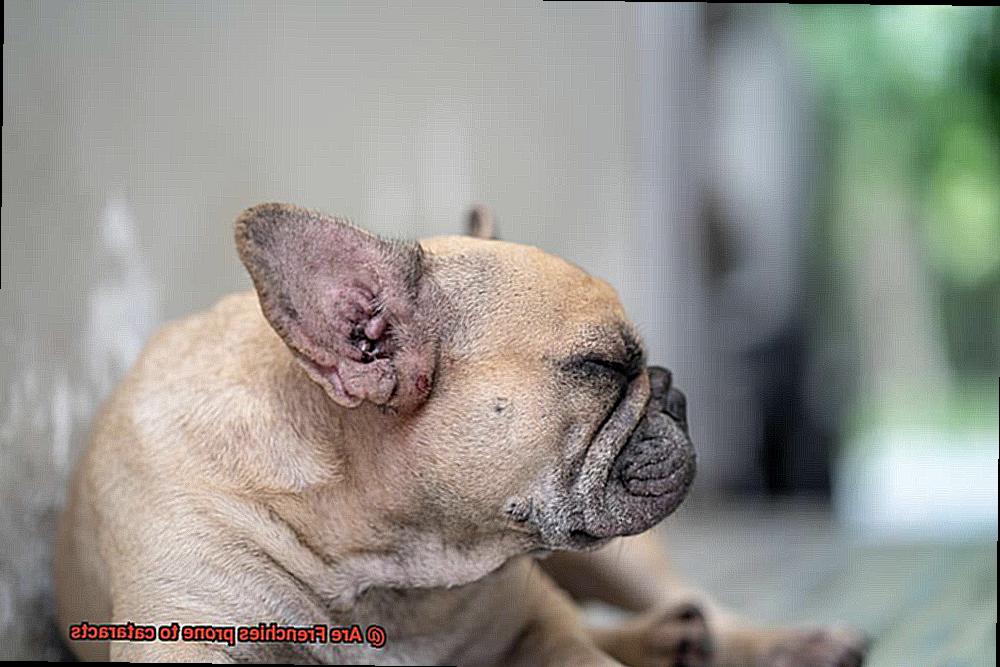
Cleaning your Frenchie’s eyes is an essential part of their eye care routine. Use a gentle, pet-safe eye cleanser to remove any debris or buildup that could lead to infections or other eye problems. Get guidance from your veterinarian on the proper techniques, and you’ll be the hero of their eye hygiene.
Sunlight – The Sneaky Villain:
Did you know that excessive sunlight can contribute to the development of cataracts in dogs? Protect your Frenchie’s eyes from those harmful UV rays by considering doggy sunglasses or providing shade when they’re out and about. Keep those eyes safe from the sun’s evil clutches.
Weight Watchers: The Battle Against Obesity:
Maintaining a healthy weight is crucial for overall health, including your Frenchie’s eye health. Obesity has been linked to an increased risk of cataracts, so make sure they get plenty of exercise and a balanced diet. Be their personal trainer and guide them towards a fit and fabulous life.
The Benefits of Seeking Veterinary Attention Promptly for Dogs with Cataracts
Regular check-ups with your veterinarian can be your secret weapon in detecting cataracts early on. Just like a superhero’s keen senses, these check-ups can help identify cataracts in their initial stages, allowing for swift treatment. Why wait for the villainous cataracts to wreak havoc on your Frenchie’s vision when you can catch them in the act and take action?
Preserving Vision: The Power to Slow Down Cataracts
Swift veterinary attention can help slow down the progression of cataracts and potentially save some of your Frenchie’s vision. Imagine being able to preserve their vision, allowing them to continue zooming around like the superheroes they are. With the right treatment plan, your veterinarian can help keep those cataracts at bay and ensure your Frenchie sees the world in all its glory.
Unmasking Underlying Causes: Revealing the Truth Behind Cataracts
Cataracts may not always be the sole culprit – there could be other underlying causes like diabetes or genetic conditions. Seeking veterinary attention promptly can help rule out these hidden villains and provide a more comprehensive treatment plan for your Frenchie’s overall health. Your veterinarian will unravel these mysteries and guide you towards a solution that suits your Frenchie’s unique needs.
Choosing the Right Treatment: A Tailor-Made Solution
No two superheroes are alike, and the same goes for dogs with cataracts. Depending on the severity of the cataracts and your Frenchie’s overall health, treatment options may vary. Your veterinarian will assess the situation, consider all the factors, and guide you towards the most appropriate treatment option – be it surgery or non-surgical management techniques. Together, you’ll come up with a plan that fits your Frenchie’s needs like a custom-made superhero suit.
Relieving Discomfort: Saving the Day for Your Frenchie’s Eyes
Cataracts can cause discomfort and even pain for your Frenchie. Eye irritation, inflammation, and secondary infections can be real supervillains when it comes to their eyes. But fear not. Seeking veterinary attention promptly can help address these issues head-on, relieving your Frenchie from any discomfort and improving their quality of life. It’s like having a superhero healer on your side, ensuring your Frenchie’s eyes are as comfortable as can be.
Monitoring and Support: A Sidekick for Your Frenchie’s Journey
Regular check-ups and follow-up visits are like having a trusty sidekick by your side. Your veterinarian will monitor the progression of the cataracts, make any necessary adjustments to the treatment plan, and provide guidance and support throughout the entire process. They’ll be there every step of the way, fighting alongside you to ensure the best possible outcome for your Frenchie’s vision and overall well-being.
How to Recognize the Early Signs of Cataracts in Your Frenchie
French Bulldogs, also known as Frenchies, are adorable and lively dogs. However, just like humans, they can develop cataracts, a common eye condition that affects their vision.
As a Frenchie owner, it’s important to be able to recognize the early signs of cataracts so you can provide the necessary care and treatment. In this article, we will explore the early signs of cataracts in French Bulldogs and discuss how to take appropriate action.
Cloudiness in the Eyes:
One of the first signs of cataracts is a cloudiness or opacity in the lens of the eye. You may notice that your Frenchie’s eyes appear hazy or foggy. This cloudiness can start small and gradually worsen over time. It’s essential to monitor both eyes for any changes.
Change in Eye Color:
Another early sign of cataracts in French Bulldogs is a change in eye color. The affected eye(s) may appear more yellow or brownish than usual. If you notice this color change, it could be an indication of cataracts.
Changes in Vision:
Pay attention to any changes in your Frenchie’s vision. If they start bumping into objects, seem disoriented, or hesitate to move around, it could be a sign that cataracts are affecting their vision. They may struggle to see things clearly both up close and far away.
Sensitivity to Light:
Cataracts can make your Frenchie more sensitive to light. Watch for signs such as squinting or avoiding bright lights. They may prefer dimly lit areas and seek shade more often.
Regular Eye Exams:
Regular eye exams are crucial for early detection of cataracts in French Bulldogs. Schedule appointments with a veterinary ophthalmologist who can perform a thorough examination and provide appropriate treatment options. This will help manage cataracts and preserve your Frenchie’s vision.
4T_jaZv-uns” >
Conclusion
French Bulldogs, those adorable and lovable companions, are unfortunately prone to developing cataracts. These cloudy formations in the eye lens can impair their vision and lead to discomfort. It’s essential for Frenchie owners to be aware of this potential health issue and take proactive measures to protect their furry friends’ eyesight.
Cataracts can occur in French Bulldogs due to a variety of factors, including genetics, age, and certain underlying health conditions. While some dogs may develop cataracts as they age naturally, Frenchies seem to have a higher predisposition to this condition compared to other breeds. This is why it’s crucial for Frenchie owners to monitor their pet’s eye health regularly.
Early detection is key when it comes to managing cataracts in French Bulldogs. Regular veterinary check-ups that include thorough eye examinations are essential for identifying any signs of cataract formation. The sooner the condition is detected, the better chance there is for successful treatment or management options.
When it comes to treatment, surgery is often the most effective solution for advanced cataracts in French Bulldogs. Skilled veterinary ophthalmologists can remove the cloudy lens and replace it with an artificial one, restoring your Frenchie’s vision and improving their overall quality of life.
Prevention is also crucial in maintaining your Frenchie’s eye health. Ensuring they have a balanced diet rich in antioxidants can help reduce the risk of cataract development. Additionally, protecting their eyes from excessive sunlight exposure by using doggy sunglasses or limiting outdoor time during peak UV hours can be beneficial.
In conclusion, while French Bulldogs may be prone to developing cataracts, proactive care and regular vet check-ups can help manage this condition effectively.
